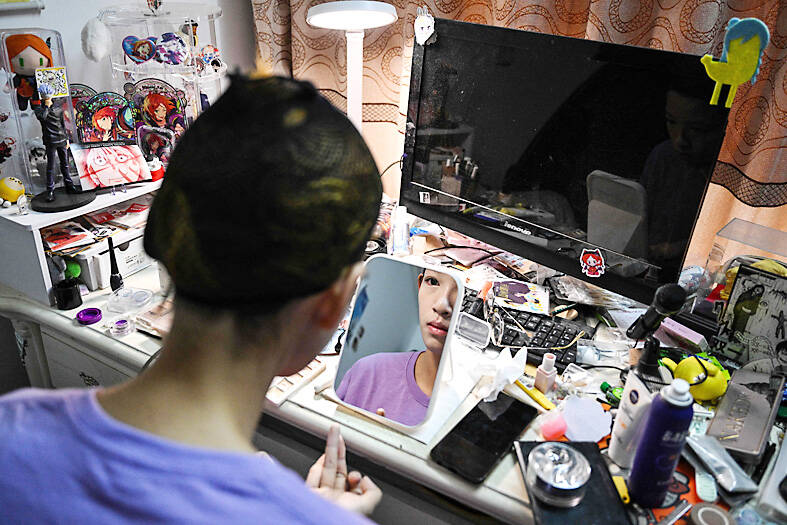During her final years of high school, Chinese teenager Xu Yunting found an unusual way to make some pocket money: transforming herself into male video game characters and taking their female devotees on dates.
The trend, called “cos commissioning,” has gained traction in China recently, with social media posts garnering millions of views as an increasing number of young women use their purchasing power to engineer a meeting with their dream man in real life.
One early morning in Shanghai last month, Xu carefully inserted contacts to enlarge her irises and adjusted a tangerine wig to transform into “Jesse,” a character from the romance quest mobile game “Light and Night.” A tall and sensitive musician, he is one of five characters that woo players throughout the game — and for client Feng Xinyu, a vivacious 19-year-old, the ideal partner.

Photo: AFP
“I don’t have a boyfriend because I’m not interested in 3D men,” Feng said, using a term for “real-life” men. “I like anime characters a little bit more, they’re more appealing to me.”
“Light and Night,” made by tech giant Tencent and aimed squarely at young women, promises a “brand-new interactive experience of highly immersive love.”
Players like Feng, who form strong emotional connections with characters in such games, are known as “dream girls” — and cos commissioning takes the immersion to the next level by dragging those 2D beaus off the screen and into the real world. Feng has commissioned Xu twice before, for a fee of around US$70. Last month, she spent US$2,800 on a multi-day trip with another Jesse cosplayer to a different province.

Photo: AFP
But she decided she preferred Xu’s portrayal and hired her for a third date. “We really click,” Feng said. “She’s just like the character from the game, it feels like we were meant to be together.”
RECONSTRUCTING GENDER RULES
Feng was waiting for Xu at a metro station, and grinned in unabashed delight when she spotted her. The two appeared relaxed, holding hands and chatting happily as they headed to their first activity.

Photo: AFP
Their date — all planned and paid for entirely by Feng —lasted all day, beginning with tea and ending with a hotpot meal and a romantic stroll. At both a doll-painting workshop and cake-decorating class they attended, they were one of many cos commission pairs. Staff at the latter business said they had noticed more and more couples coming in over the past year — sometimes dozens on busy days.
Part of the appeal, experts studying the phenomenon say, is that it gives young women a way to perform an idealized heteronormative relationship. Conservative social attitudes towards women remain widespread in China, often reinforced by state media and popular culture.
Aside from assuaging safety concerns, hiring a female cosplayer ensures a level of equality and understanding not necessarily guaranteed in a real-life relationship.

Photo: AFP
“I don’t think it’s important what gender the person being commissioned is,” Fudan University’s Tian Qian said. “What is important is that (the cosplayer) is a vessel, because the client needs a vehicle for their emotions.” Another academic, Zhou Zixing, wrote that cos commissioning allows women “to gain a voice that is fully respected by the opposite sex ... responding to, breaking, and reconstructing the gender rules of the real world.”
HEALING EFFECT
At the cake-decorating class, Feng leaned over the table, fondly watching Xu pipe generous amounts of icing onto a sponge cake. Afterwards, Xu gently helped Feng remove her apron, modelling Jesse’s gentlemanly behavior.
“The guys in the games are all quality guys,” Xu said. “I think (clients) will be able to improve their requirements in real life in terms of what they want from a man, so that they don’t settle for low-quality guys.”
Her mother Fang Xiuqing admitted her initial reaction when she learned what Xu was doing was: “How could this happen to my daughter?” But she has since come around to the idea. “I don’t think it’s a profession, it’s a hobby,” said Fang. “She gets enjoyment from it, and she also brings joy to others.”
Tian said cos commissions can act as “emotional sustenance.” “Although this is a paid interaction, it still gives a sense of being seen, which has a certain healing effect to it.”

Taiwan has next to no political engagement in Myanmar, either with the ruling military junta nor the dozens of armed groups who’ve in the last five years taken over around two-thirds of the nation’s territory in a sprawling, patchwork civil war. But early last month, the leader of one relatively minor Burmese revolutionary faction, General Nerdah Bomya, who is also an alleged war criminal, made a low key visit to Taipei, where he met with a member of President William Lai’s (賴清德) staff, a retired Taiwanese military official and several academics. “I feel like Taiwan is a good example of

March 2 to March 8 Gunfire rang out along the shore of the frontline island of Lieyu (烈嶼) on a foggy afternoon on March 7, 1987. By the time it was over, about 20 unarmed Vietnamese refugees — men, women, elderly and children — were dead. They were hastily buried, followed by decades of silence. Months later, opposition politicians and journalists tried to uncover what had happened, but conflicting accounts only deepened the confusion. One version suggested that government troops had mistakenly killed their own operatives attempting to return home from Vietnam. The military maintained that the

Before the last section of the round-the-island railway was electrified, one old blue train still chugged back and forth between Pingtung County’s Fangliao (枋寮) and Taitung (台東) stations once a day. It was so slow, was so hot (it had no air conditioning) and covered such a short distance, that the low fare still failed to attract many riders. This relic of the past was finally retired when the South Link Line was fully electrified on Dec. 23, 2020. A wave of nostalgia surrounded the termination of the Ordinary Train service, as these train carriages had been in use for decades

Lori Sepich smoked for years and sometimes skipped taking her blood pressure medicine. But she never thought she’d have a heart attack. The possibility “just wasn’t registering with me,” said the 64-year-old from Memphis, Tennessee, who suffered two of them 13 years apart. She’s far from alone. More than 60 million women in the US live with cardiovascular disease, which includes heart disease as well as stroke, heart failure and atrial fibrillation. And despite the myth that heart attacks mostly strike men, women are vulnerable too. Overall in the US, 1 in 5 women dies of cardiovascular disease each year, 37,000 of them